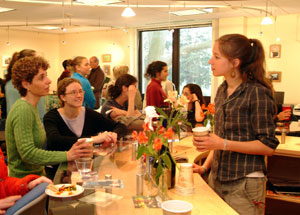CENTER FOR PEACE AND GLOBAL CITIZENSHIP CAFÉ PROVIDES NEW SPACE FOR ALL THOSE INTERESTED IN SOCIAL JUSTICE

Details
At the opening of the Center for Peace and Global Citizenship Café on May 4, Associate Professor of Political Science Anita Isaacs related a story, originally told to her by an indigenous activist in Guatemala, which served as the inspiration for this new space:
Years ago, an American World Bank employee was sent to Brazil to assist an indigenous community with its development plans. She had many ideas to share, but the community leaders knew what they wanted:“All we need is a cantina,” they told her. She soon left in frustration, unable to sway them from this notion. Driven by curiosity, she returned to this community two years later to see how they were faring, and was stunned to find that a main road, a school, and a health center—all aspects of her original plan—had been built. When she met with community leaders, she learned that all of these things were made possible because of the cantina they had created with the help of a European organization. Once the cantina was in place, the community had somewhere to meet and discuss what else they believed was needed.
In the same vein, according to Isaacs, a café was what the CPGC needed to continue advancing its mission of working for global peace and social justice. This bright, roomy space in Stokes provides a place for faculty, staff, and students to cross paths and discuss their common goals as they relate to the Center's philosophy.
Open weekdays 3-5 p.m. (during the summer, 2-4 p.m.), the Café will host classes Monday and Tuesday evenings and can be reserved for speakers, lectures, meetings, and other Center-related events. Student managers and employees serve fair trade coffee along with an assortment of espresso beverages and Italian sodas. All cups are made from recycled paper, and all plasticware is biodegradable and made from non-GMO corn. Visitors will find an assortment of international magazines and newspapers, and a wall of clippings offers examples of social justice in action. A flat-screen television is tuned to various news channels. The walls are decorated with photographs from students' international travels, facilitated through classes, independent research, or Center-funded internships.
Prominent among the Café's décor is a memorial plaque dedicated to Carol Wilkinson, former assistant to the provost for faculty services, who passed away in January. Her longtime dedication to the Center's efforts and programs was integral to its growth and progress.
For more information about the Café, call (610) 896-1205.



